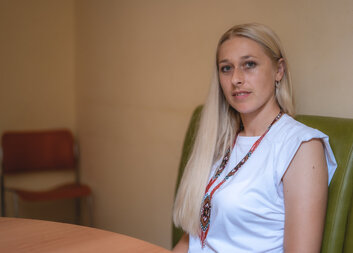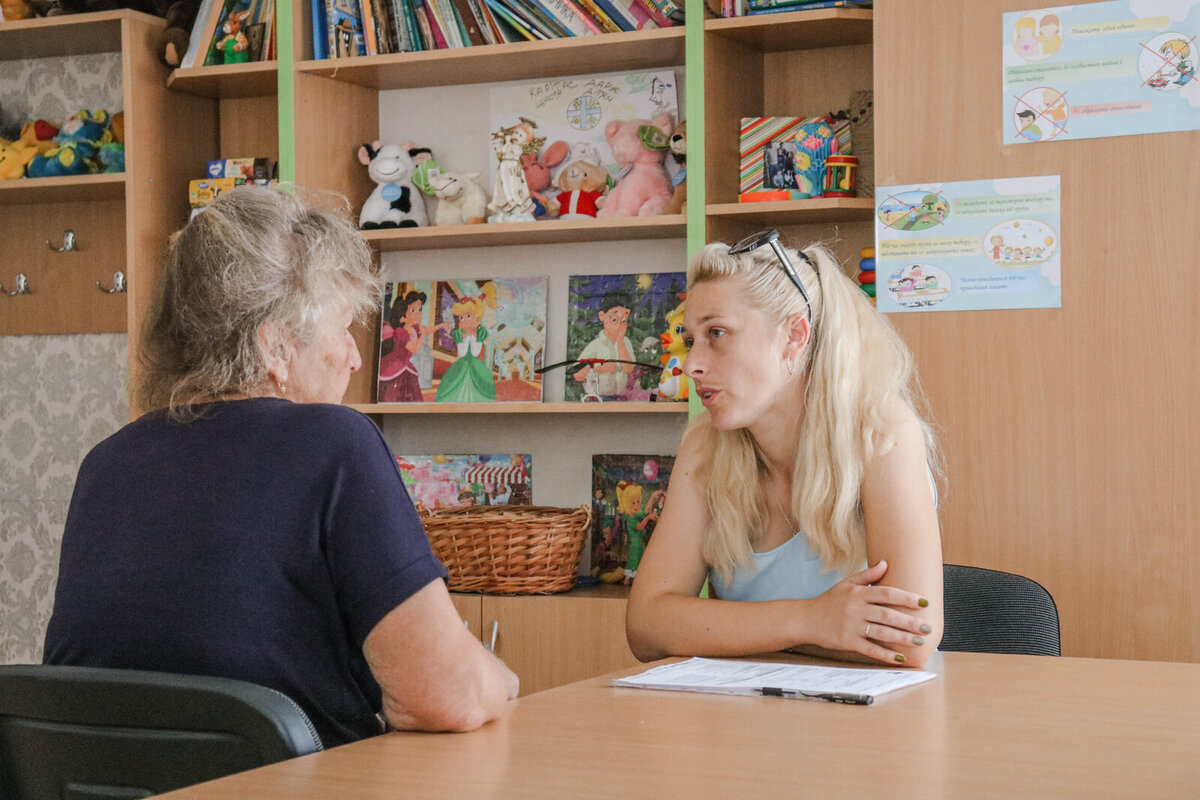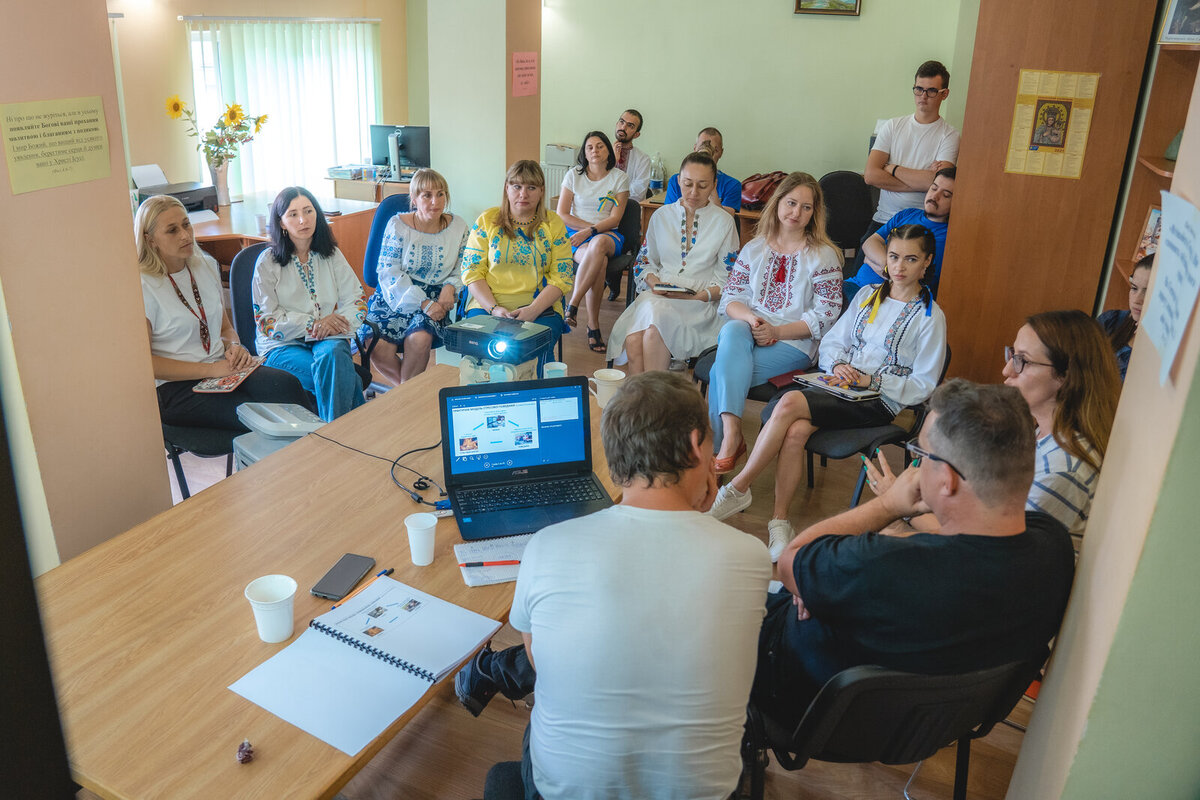Ulyana Popova іs a psychologist, who has been working for Caritas Ukraine for more than 4 years. Since the beginning of the war, her work has changed completely. She helps people forced by the war out of their homes to safer parts of Ukraine overcome war horrors and integrate into their new reality. She helps people to learn how to live a normal life in the shadow of the war. Caritas Czech Republic provides psychological training for specialists like Ulyana.
Experts from the Czech Republic have come to Ukraine to share their experiences about how to help people experiencing a huge trauma or deep loss. The other important area they focus on in their training is the psychologists' self-care; how to handle so much grief and still be able to help others. We have talked to Ulyana about her experience supporting people fleeing the war zones of Ukraine.
You have been working as a psychologist for many years. How has the war changed your work?
Obviously, this is a new experience for me. I had not worked with internally displaced persons before the war fully broke out (Ukraine has been dealing with people forced out of their homes for 8 years, since the Russian aggression against Ukraine started in 2014). The anxiety and the fears people bring to me now are different, and we are all learning how to deal with them.
When did people need your help more: at the beginning of the war or now, half a year later?
At the beginning of the war, there were very few people who came to us searching for psychological support. Back at that time, people forced to leave their homes were in huge shock and stress. They had to take care of such basic needs such as food and housing. First, they needed to feel safe, I mean that there was no immediate threat to their lives. Once they had moved from a dangerous place, people worried mainly about finding a place to spend the night and something to eat. How they were feeling was not that important right there and then.
After 2-3 months, people started feeling that something was hurting in their hearts. Something was pressing on them. Something was wrong with them. And this is the time when people are ready to talk to someone. So, if we are talking about the first two or three months, there were not many people searching for psychological support, there were one or two of them a day. Now, there may be 10-15 people approaching me every day. So many more.
For an outsider, it is very difficult to imagine the pain people forced out of their homes by the war are experiencing. Would you be able to explain what they are going through?
It is the pain of loss. People have lost someone they knew, someone they loved, or even members of their families. It is very painful. They really do not know what to do. But that is not just the loss of people they loved. It is also about the loss of life they had before the war. They have lost everything they had: their home, city, hobbies, roads they used to walk, status, everything. Their life in general. It is also a loss of social significance. Because all of them had some important role in society.
For example, I am currently working with a woman who used to live in a big city before the war. She was a businesswoman, she had her own house and several cars, she had bought an apartment for each of her children, she could give her grandkids a tour to an amusement park in a European city for their birthday… I mean, she was rich and she played an important role in other people’s lives. And now she is living in a shelter for internally displaced persons because all her property has been either destroyed by Russian bombs or taken by Russian soldiers. She is asking for money from Caritas to buy a mattress and pillows. It is a huge blow to her self-esteem. In this case, a person breaks down and falls into a deep depression. In such situations, people very often experience panic attacks. It is very important to help them.
It must be difficult to open up in such situations. Do people affected by the war easily agree to a conversation with a psychologist?
We have individual meetings and group ones. People in general do not easily agree to a conversation with a psychologist. But it is much easier to talk to them in a one-to-one meeting. It is harder for them to speak in a group. In group sessions, a person usually wears a social mask. They pretend that everything is fine. They say they are ok, they have no worries, they have coped with everything and are strong. People are actually not ready to open up in general. Especially not in public.
But can you at least identify who exactly needs a one-to-one meeting during a group session?
Yes, that is how it usually works because, at a group meeting, people hear each other´s stories. There is always someone who starts and everyone then understands that they are not the only ones with deep pain in their heart, and that it is ok to need help. They see they are normal. And that's how we can identify those who need our personal attention. That is how they get the courage to talk.
You have described the hesitations people might have to ask for help. How can you reach the internally displaced? Do they come to you, or do you visit collective centers by yourself and initiate the meetings?
Both ways. Sometimes we can get to adults through their kids. Parents bring their children to us and first we are talking about the children. And then we ask them: "How do YOU feel?". Because it is obvious that children are a mirror of their parents. If parents are in pain, children will be in pain as well.
Children are exceptionally vulnerable in the war situation. How do they go through the war horrors?
Well, now we are working with people, both children and adults, who have already passed the stage of stress. Now we get requests for emotional support, because people we work with in Drohobych have been living here for some time. So, they need emotional support. They feel emotional exhaustion. They experience certain disturbing memories, they have fears. It is very difficult for them to sleep.
Very often people live in schools and dormitories, so many people live in one room, or they must share some private spaces, usually a kitchen or a bathroom, with others. Of course, they have conflicts with each other.
Most children often experience triggers. That means, they hear an unexpected sound, such as a bottle falling, a door closing, something that they did not expect, and they react very emotionally to this unexpected sound. You know, these children witnessed shelling. At such moments, they feel danger, they think that now there will be shelling again, or some rocket will fall. A kid can fall on the floor at that moment, climb under the table, or hide in a wardrobe. Any place that seems to be safer than the room they are in. War has hurt them very badly.
Russian aggression is causing a lot of pain and it is very important for everyone to be emotionally stable. How do you deal with your own stress and pain?
I personally also went through all those stages of stress myself because I am also a Ukrainian and the war causes a lot of pain for me as well. But I also get support from my mentor. I am trying to manage and cope with my worries and fears to be useful to other people. Actually, the training we had from our colleagues from the Czech Republic was also about taking care of oneself.
Tomas Adamek and Roman Gronsky are psychologists from the Fire Rescue Service in the Czech Republic who ran the training you have just mentioned. What was the training about?
The training itself had two parts. The first of them was about crisis intervention and how to stabilize people who are affected by a sudden disaster. We were trying to understand how people feel when they are under stress, and we also talked about the difference between a person under stress and a person who is traumatized.
The second topic focused on psychologists and social workers. Obviously, it is very important as well because you can help others only if you are healthy yourself. It was a very useful training and we can definitely use their experience in our work. We can copy their work methods and technique; the way they provide crisis intervention, the way they stabilize a person's emotional state, and which should be the first word to a person under stress.
Thank you for the interview.












